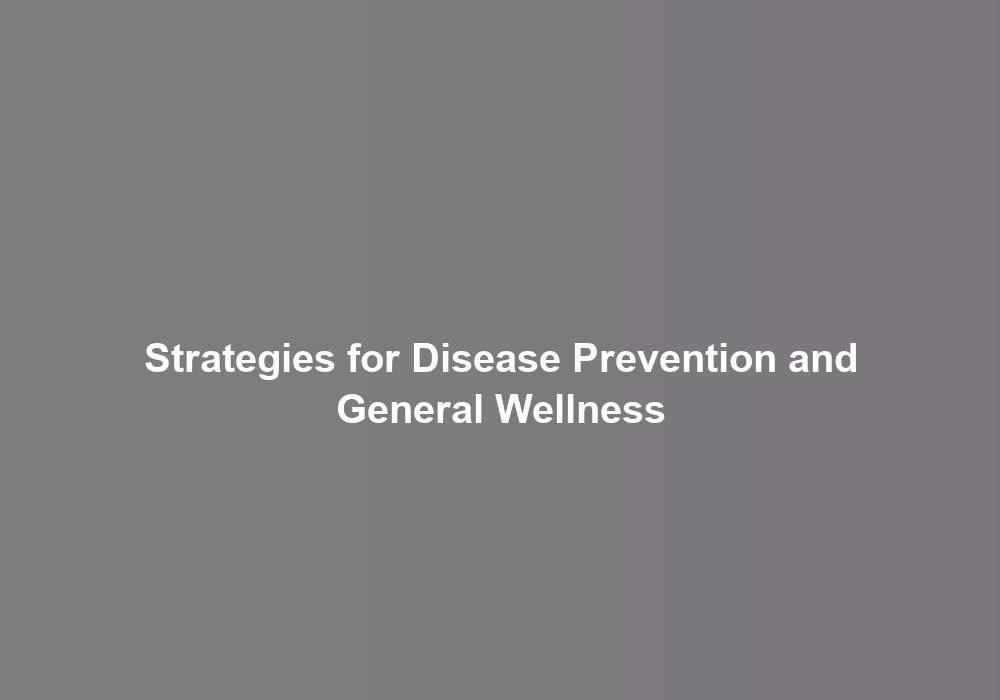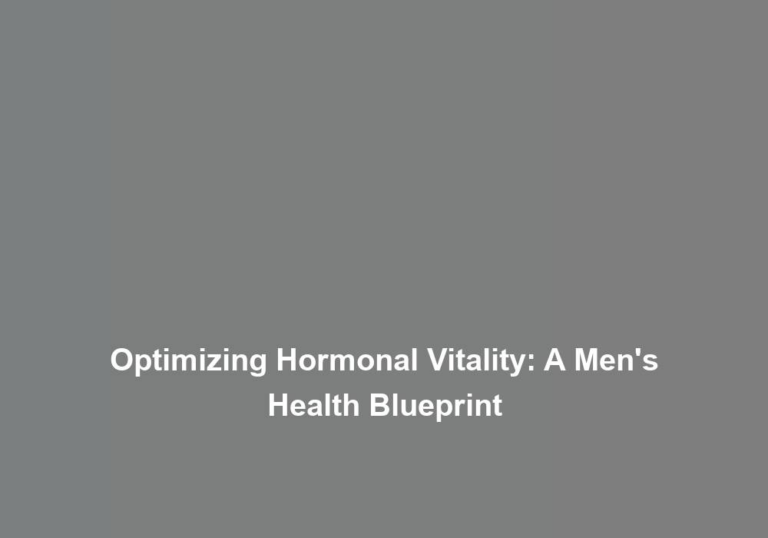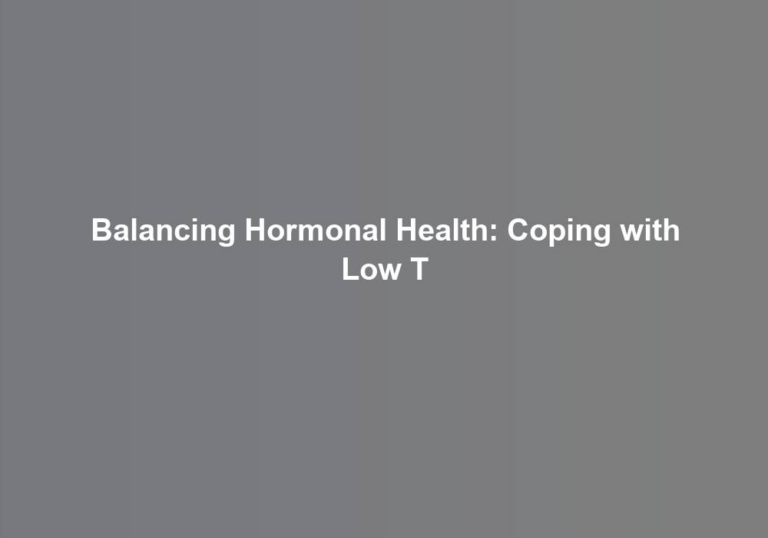Strategies for Disease Prevention and General Wellness
You know that staying healthy is crucial, but sometimes it can feel like an overwhelming task. With so much information out there, itG??s hard to know where to start. But what if there were a few simple strategies you could implement into your daily routine that could make a significant impact on your overall wellness? In the next few paragraphs, weG??ll explore some practical and effective ways to prevent diseases and maintain your general well-being.
Importance of Regular Exercise
Engaging in regular exercise is an essential component of maintaining overall health and well-being. Regular physical activity offers a myriad of fitness benefits that extend beyond just physical appearance. It plays a crucial role in disease prevention and contributes significantly to your general wellness.
Consistent physical activity, such as brisk walking, cycling, or swimming, can improve your cardiovascular health. It strengthens the heart and enhances circulation, reducing the risk of heart disease and stroke. Additionally, engaging in regular exercise helps manage weight, reducing the likelihood of obesity and related conditions like type 2 diabetes.
Moreover, regular physical activity is associated with improved mental health. Exercise stimulates the release of endorphins, the bodyG??s natural feel-good hormones, which can alleviate feelings of stress and anxiety. Furthermore, it can enhance cognitive function and reduce the risk of developing depression.
Incorporating regular exercise into your routine also supports the strength and functionality of your muscles and bones. This is particularly important as you age, as it can help prevent osteoporosis and reduce the risk of falls and fractures.
Balanced and Nutritious Diet
Regular exercise plays a pivotal role in maintaining overall health and well-being, and complementing this with a balanced and nutritious diet is equally essential for optimal wellness. Healthy eating involves consuming a variety of nutrient-dense foods from all food groups to ensure your body receives the essential vitamins and minerals it needs to function properly. Additionally, portion control is crucial for managing weight and preventing overeating. HereG??s a simple guide to help you make healthier food choices and practice portion control:
| Healthy Eating | Portion Control |
|---|---|
| – Include a variety of fruits and vegetables in your meals | – Use smaller plates to control portion sizes |
| – Choose whole grains over refined grains | – Measure out appropriate serving sizes |
| – Opt for lean proteins such as poultry, fish, and legumes | – Avoid eating directly from food containers |
| – Incorporate healthy fats like avocados, nuts, and olive oil | – Be mindful of portion sizes when dining out |
| – Limit added sugars and sodium intake | – Pause between bites and savor your food |
Stress Management Techniques
To effectively manage stress, it is important to incorporate proven techniques for relaxation and emotional well-being into your daily routine. Stress can have a significant impact on your overall health, so finding ways to manage it is crucial. Here are some evidence-based strategies to help you effectively manage stress and promote general wellness:
-
Meditation and Relaxation Techniques
-
Engaging in mindfulness meditation, deep breathing exercises, or progressive muscle relaxation can help calm your mind and reduce stress levels. These techniques have been shown to lower cortisol levels, the hormone associated with stress, and promote a sense of calm and well-being.
-
Time Management and Self-Care
-
Prioritizing your tasks and setting realistic goals can help reduce feelings of being overwhelmed. Allocating time for activities you enjoy, such as hobbies or spending time with loved ones, is also essential for managing stress. Taking care of your physical health through regular exercise, adequate sleep, and a balanced diet can contribute to a greater sense of well-being and resilience to stress.
Incorporating these strategies into your daily routine can help you better manage stress and promote general wellness. Remember, itG??s important to find what works best for you, as everyoneG??s response to stress management techniques can vary. By prioritizing your emotional well-being and seeking support when needed, you can cultivate a sense of belonging and resilience in the face of lifeG??s challenges.
Adequate Sleep and Rest
As you prioritize your emotional well-being and seek support when needed, ensuring adequate sleep and rest plays a crucial role in managing stress and promoting overall wellness. Sleep hygiene, which refers to practices and habits that are conducive to sleeping well on a regular basis, is essential for your physical and mental health. Incorporating restorative naps into your daily routine can also provide numerous benefits, such as improved mood, enhanced cognitive function, and increased alertness.
| Benefits of Adequate Sleep and Rest | Examples of Sleep Hygiene Practices | Tips for Restorative Naps |
|---|---|---|
| 1. Enhanced mood and emotional well-being | 1. Establish a regular sleep schedule | 1. Keep naps short (around 20-30 minutes) |
| 2. Improved cognitive function and focus | 2. Create a relaxing bedtime routine | 2. Find a quiet and comfortable space |
| 3. Increased alertness and energy levels | 3. Ensure your sleep environment is conducive to rest | 3. Avoid napping too close to bedtime |
Adequate sleep and rest are foundational to your overall health. By practicing good sleep hygiene and incorporating restorative naps when needed, you can significantly impact your well-being. ItG??s important to recognize the value of quality sleep and make it a priority in your daily routine.
Regular Health Check-ups
Scheduling routine health check-ups is essential for maintaining your overall well-being and detecting any potential health issues early on. By visiting your healthcare provider for annual exams, you are taking proactive steps towards preventive screenings, which can help in early detection of various health conditions. Here are some reasons why regular health check-ups are crucial:
-
Peace of Mind: Knowing that you are regularly monitoring your health can provide a sense of reassurance and peace of mind. ItG??s comforting to know that you are actively taking charge of your well-being.
-
Emotional Well-being: Regular health check-ups can contribute to your emotional well-being, allowing you to feel more secure and confident about your health status. This can positively impact your overall quality of life and sense of belonging within your community.
-
Early Detection and Treatment: Many health conditions, such as hypertension, diabetes, and certain cancers, may not present obvious symptoms in their early stages. Through regular check-ups, potential issues can be detected early, enabling timely intervention and treatment.
Visiting your healthcare provider for annual exams not only demonstrates your commitment to maintaining good health but also allows you to cultivate a sense of belonging within a community that prioritizes wellness. By actively engaging in preventive screenings and early detection through regular health check-ups, you are taking the necessary steps to safeguard your well-being and enjoy a fulfilling, healthy life.
Conclusion
In conclusion, incorporating regular exercise, a balanced diet, stress management techniques, adequate sleep, and regular health check-ups into your lifestyle is like building a strong foundation for a sturdy house. Just like a well-constructed house can withstand the elements, these strategies can help fortify your body against disease and promote general wellness. By prioritizing these habits, you can take proactive steps towards maintaining a healthy and vibrant life.







